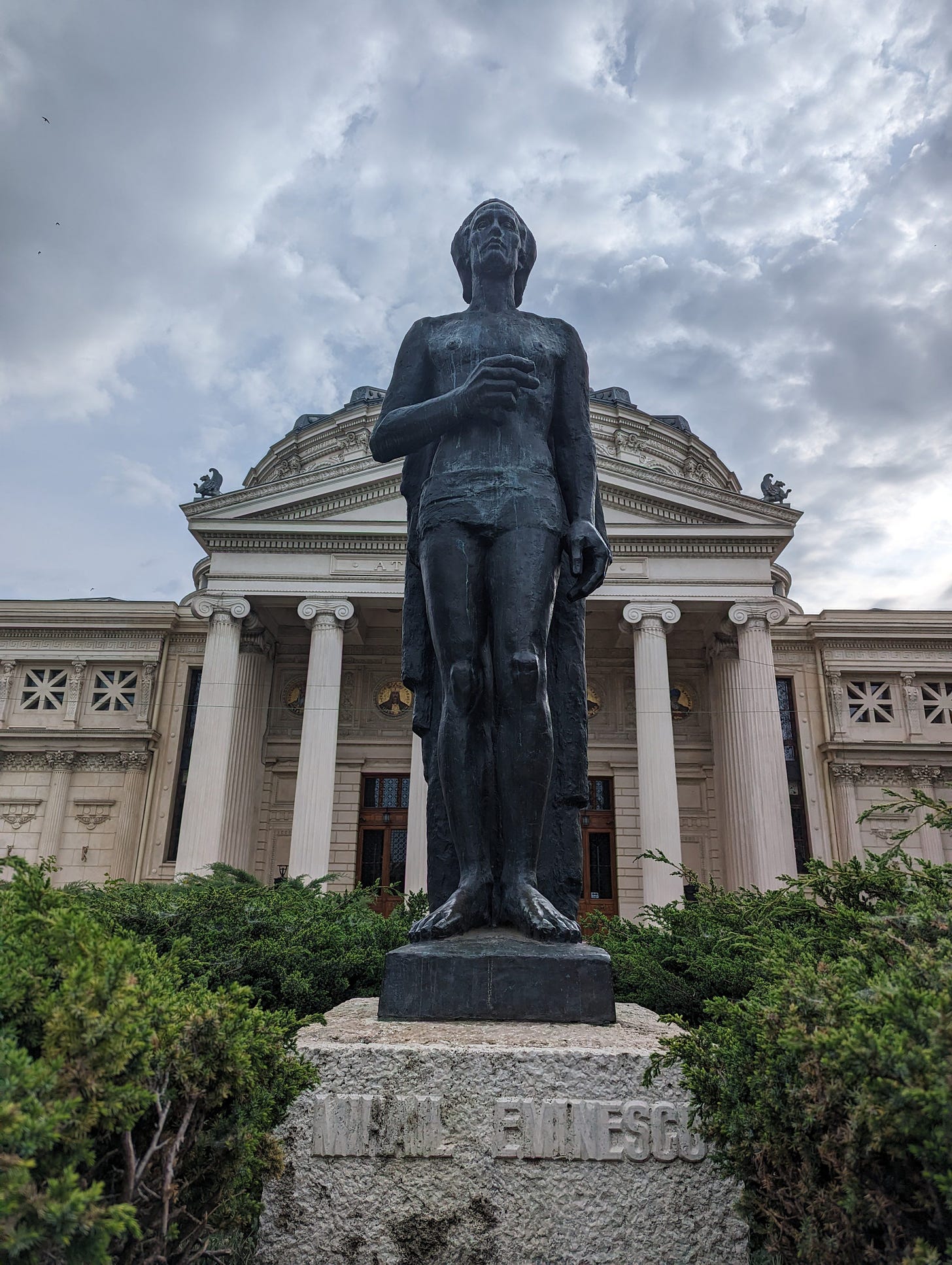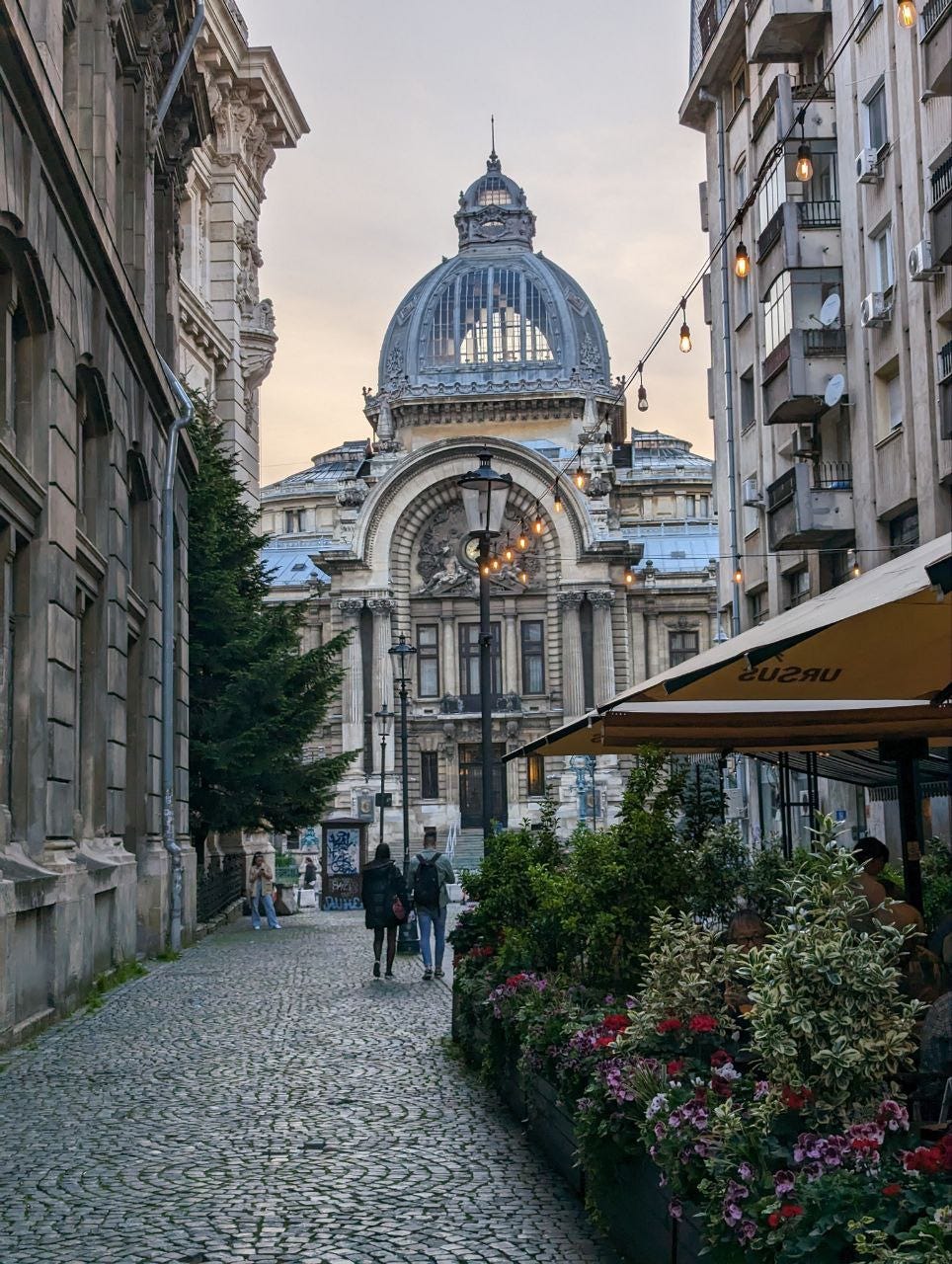On my last day in Bucharest, I woke up around 4 in the morning and took an Uber to the airport where I dropped off my wife and daughter. Due to our last-minute travel plans their flight ended up being one day ahead of mine. I waited around the airport for a bit after I checked them in, drank two espressos, and smoked a cigarette, I wanted to stay close in case they had any difficulties getting through customs or delays. Everything went smoothly so I hopped in a cab and made my way back home.
At home, I tried to go back to bed and grab a few hours of sleep but I was too excited and amped up on coffee so after having more coffee with my grandmother I decided to wander through Bucharest one last time before packing and flying out. After two weeks of sunshine, the weather turned gray and cold, depressingly reflective of my mood. I wanted to stay longer, see more of the city, experience more of the culture, and most of all spend more time with my family.
I made my way through Kiseleff Park, the park where my father and uncle used to play as children, and later my brother and I used to come with our grandparents. I passed Antipa, a museum that played a significant role in my earliest memories, that I found to be just as exciting now with my daughter as it was when I was her age. After crossing Victoria Plaza I made my way down Calea Victorie passing the now-abandoned apartment where my mother grew up and where I lived for a short time before we moved to the United States. I wandered through the neighborhood, taking random turns, and enjoying the old interwar architecture. I tried to find my old school where I attended a bit of 1st grade but I couldn’t remember where it was. Eventually, I made my way past the Ateneul Roman, passed the History Museum, and wandered into the University Square area. The rain was picking up and I spent a lot of time ducking in and out of cafes and stores to keep dry.
One of the many distinct features of Bucharest, in stark contrast to anywhere I’ve lived in the United States, is the large amount of fantastic bookstores. There is of course the beautiful Carturesti Carousel which is a popular spot for Instagram pictures, almost everyone has seen pictures of its multi-storied collection of books accessed by beautiful staircases. But, there are so many other great ones I stopped at, and at each one, I made a point to purchase one or two books.
I found English editions of several Mircea Eliade novels that are hard to find and expensive back home. I believe the copy of The Sacred and the Profane ran me almost thirty dollars when I ordered it on Amazon a few years ago. But I didn’t want English editions, what I was looking for was interesting contemporary work in Romanian and not available in English.
At one of the bookstores, Seneca Café, I asked one of the employees to recommend me a contemporary novel in Romanian. He handed me several, but the one he recommended the most was a short novella at 96 pages, by Raul Popescu called Si la inceput a fost intunericul, which roughly translates to In the beginning there was darkness. I bought it and packed it away with the many other books I ended up taking home with me.
One thing I have to note at this point in this narrative is that the last time I read a novel in Romanian was approximately 32 years ago. The extent of my formal Romanian education consisted of several months of first grade, but I spent my early childhood with my grandmother, a retired schoolteacher who taught me how to read well before my fifth birthday. My father also spent a lot of time reading with me when I was young and I have distinct memories of reading books by Verne in my room on Calea Victoriei. Nonetheless, three decades is a long time and I was somewhat concerned that I was not going to be able to understand or have a hard time making my way through adult contemporary writing but I made it my goal to read at least one of the novels I purchased.
.
This week I finally got around to starting on Popescu’s novella and I finished it in one sitting. The language came back to me effortlessly, and I only had to refer to my phone dictionary once or twice and mostly for slang that I was unfamiliar with. I don’t know if this is due to the smooth poetic language used by Popescu or by the inherit literary cadence and syntax of the Romanian language but the experience was enlightening. It’s hard for me to describe the interesting realm one enters when you read a novel in a language different than the one you speak and think in. It creates a mental space distinct from what one is used to, like driving a strange new car or seeing the world around you through sunglasses tinted a color that you are not used to. Several times while reading I caught myself formulating answers to my wife’s questions in Romanian before translating back into English.
Of course, it helped that Popescu’s Si la inceput a fost intunericul was an excellent novel, poetic and powerful, modern and literary. A novel where the narrator, an unnamed 27-year-old man, is stuck in a metaphysical limbo between life and death, at a threshold, cold and dark. His guide, a faceless man, who takes on the visages of departed family members, leads him through episodes of his life filled with regret and disappointment. He is visited by the father that abandoned him, his alcoholic uncle who was preoccupied with his businesses and series of wives, a grandmother who preferred her son over the narrator's mother as she slipped into senility, and the mother, abandoned by men who eventually succumbed to cancer. The book is short, more of a long poem than a novel, but it invokes powerful feelings of sadness, regret, and disappointment.
I hope that with the popularity and success of Mircea Cartarescu’s Solenoid in the U.S., the door is opened for more Romanian novels to be translated into English because if this is the caliber of Romanian literature there is much to read and enjoy. I’m excited that I pushed myself to read Romanian because it opens a world of novels that is distinctly different than the moribund American literary scene.






Now work on translating Orbitor for me.
Alexandru,
I really enjoyed this post. I appreciated your reflections about reading in another language, which resonates with me.
Did you find reading Romanian difficult because you came across some unknown words, or straightforward? I'm back on Twitter; if not I can go to your Notes page on Substack and compare notes between Catalan and Romanian.
The latter has always intrigued me as a Latin based language with a heavy(?) Slavic superstrate.
As for the bookstores, I'm unsurprised, and it's something Europe gets right. They're not commercial space exclusively but an organic part of the community.
Book signings, readings, activities for children, etc. The commercial bookstore chains aren't worth saving in North America. It used to be the libraries, but it'll now have to be the homes and the small bookstores in small to midsized towns where reading and the love of the written word is rekindled.
Thanks for the post. It was great!
xavier